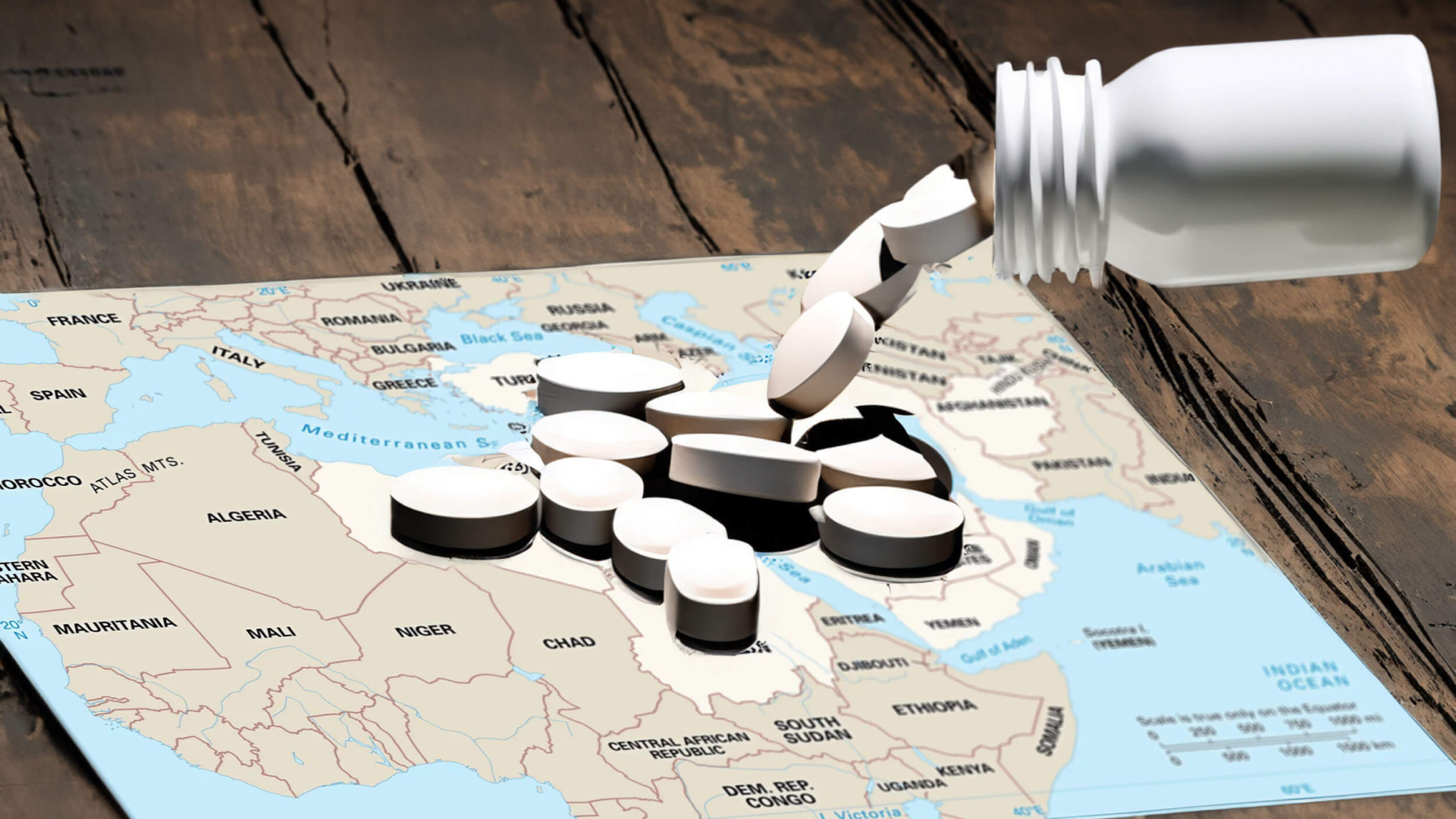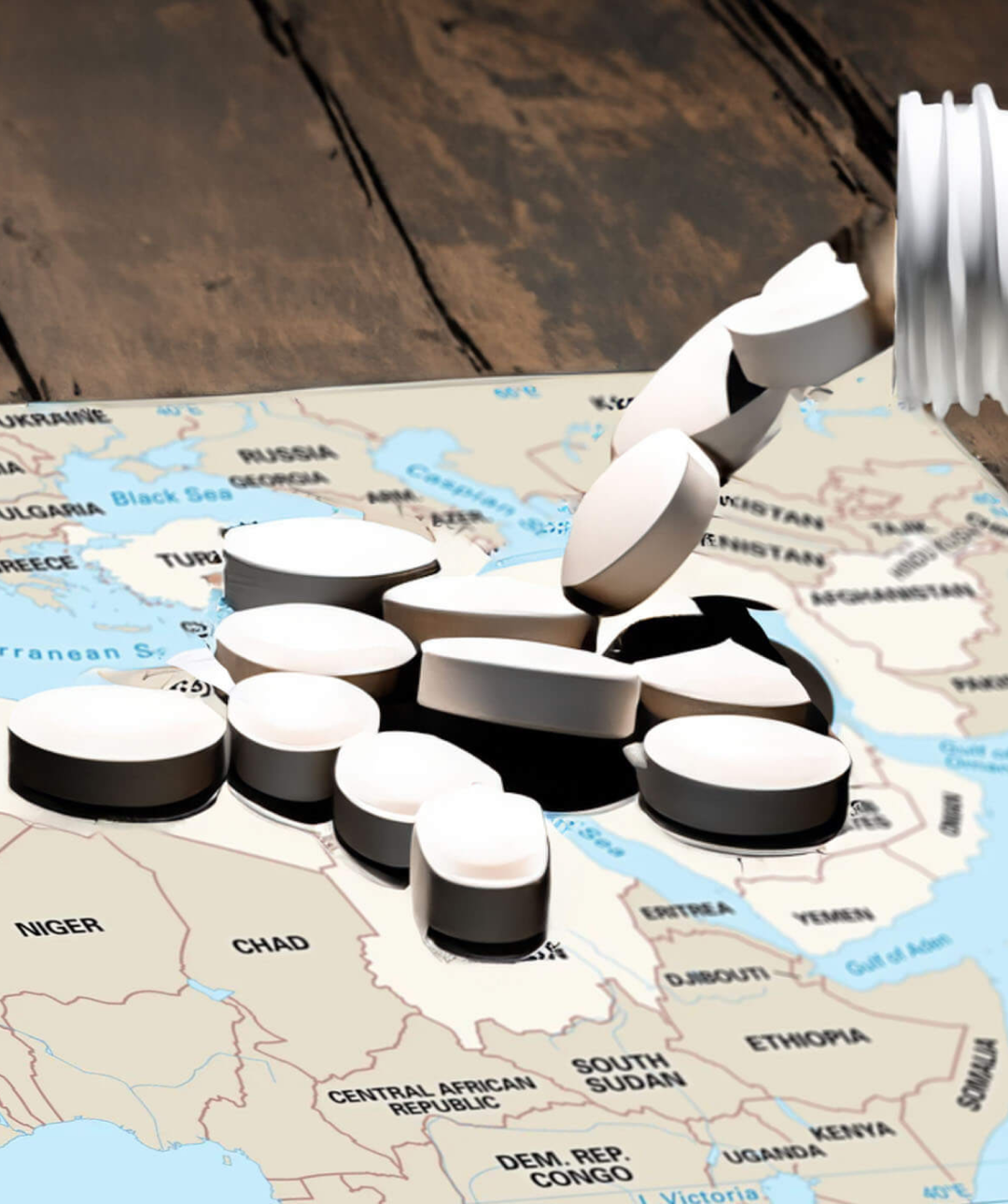

Illustration by Lucian French, designer
Captagon, commonly known as the “poor man’s cocaine,” has recently re-emerged as a popular recreational drug and is rapidly spreading throughout the Middle East and North Africa. Originally a German-manufactured stimulant intended to treat attention deficiency disorders, this small white pill is packed with Fenethylline, caffeine, and other stimulants. In 1986, after being flagged by the World Health Organization in the Convention of Psychotropic Substances, Captagon was marked illegal and discontinued in legitimate markets. However, an illicit version of Captagon emerged in Eastern Europe and later the Arab region. Its popularity skyrocketed in Syria following the 2011 Arab Spring protests.
Today, Captagon’s underground production and trade boast an astonishing value. In 2021 alone, the drug garnered an estimated worth of $5.7 billion. Captagon’s demand lies in its popularity with Arab authoritarian regimes, which hold draconian anti-drug laws and target vulnerable individuals in the region, making it an especially dangerous drug trade.
Investigations conducted by The New York Times, BBC, and the Organized Crime and Corruption Reporting Project found that the majority of Captagon production and distribution inside Syria is supervised by the Fourth Armored Division of the Syrian Army, an elite unit commanded by Maher al-Assad, President Bashar al-Assad’s younger brother. These reports indicate that Fourth Division’s officers allow vehicles transporting Captagon to move across checkpoints in Syria without restraint.
Since the onset of the 2011 conflict, Syria has faced severe international sanctions, so the Captagon trade has been a lifeline to the Assad regime; it funds its war and perpetuates its ongoing human rights abuses and crimes.
The number, size, and value of Captagon exports from Syria continue to grow each year. Within Syria, low-quality Captagon pills are sold for $1 each, while higher-quality pills are exported and traded for around $14 in foreign markets. In 2020, 35 million pills were seized in Dubai; in March 2021, 95 million pills were seized in Port Klang, Malaysia, en route to Saudi Arabia. According to The Syria Report, a single shipment of Captagon pills intercepted by Italian customs authorities in July 2020 surpassed Syria’s entire annual exports for that year.
“The scale of the revenues . . . dwarfs the Syrian state budget,” former United States Special Envoy to Syria Joel Rayburn told the BBC.
In addition, the Middle East’s Captagon pandemic has presented major diplomatic opportunities with Syria’s Arab neighbors. The popularity of Captagon has prompted foreign ministers from Egypt, Iraq, Saudi Arabia, and Jordan to initiate discussions with the regime in an effort to curb the growing rates of addiction. Not to mention Syria’s return to the Arab League in May. Thus, the Captagon trade has been weaponized as diplomatic leverage and ultimately provides the Assad regime impunity, enabling his authoritarian rule to persist with little consequence.
The destination of Captagon exports is also of major concern, as hundreds of millions of tons are transported to Gulf countries and neighboring nations like Iraq and Jordan, all of which have some of the world’s most stringent anti-drug policies. As emphasized in HRF’s report, “The Cost and Consequences of the War on Drugs,” prohibition is neither a feasible nor sustainable method of eradicating drug addiction; it constructs a cycle of punishment that further harms addicts and does little to treat their dependence. Rather, providing rehabilitation and health services to addicts and improving the societal conditions that lead to drug abuse are more effective strategies for tackling addiction. Democratic states like Portugal have demonstrated the effectiveness of decriminalization, which opens up space for informed discussions on addiction and treatment.
In contrast, the United Arab Emirates (UAE) imposes strict penalties, including a minimum four years prison sentence and fines of at least 10,000 dirhams ($2,730) for drug use. In Saudi Arabia, the Directorate for Narcotics Control imposes sentences, fines, and lashes on narcotics users, with foreigners facing deportation. It is also within the jurisdiction of judges to issue punishments, including the death penalty. Between Nov. 10 and 22, 2022, 17 men were executed for drug and contraband offenses in the Kingdom.
As the Middle East’s Captagon trade grows in strength and complexity, the need for democratic reforms grows more pressing. Syria’s investment allows for unchecked, unregulated Captagon exports, ultimately fueling the regime’s financial and diplomatic objectives. And importing countries like the UAE and Saudi Arabia enforce harsh anti-drug policies, ultimately empowering their rule. Instead of relying solely on punitive measures, importing regimes must engage in open dialogue and consider alternative democratic approaches. To curb the Captagon trade — and safeguard the region’s most vulnerable populations — authoritarian regimes and their tactics must be curbed.
Hit enter to search or ESC to close